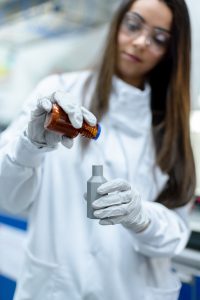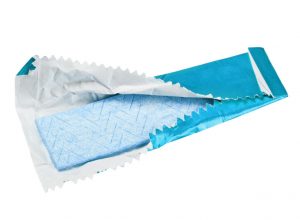
With the many toxins all around us these days, we have forgotten about neotame, but it’s still lurking out there.
Aspartame lost its patent in the early 1990s, so in order to re-up another patent, they had to tweak the original patent a bit. They added 3-dimethylbutyl (a chemical that the EPA lists as hazardous) to aspartame to make it “different“, they renamed it neotame, and applied for a new patent.
At 7,000 to 13,000 times sweeter than sugar, neotame is the most potent sweetener marketed today.
The history of neotame is inconsistent when you research it on the web, but I documented its background when it first came out, and that’s what I reference in my books. My original research shows that the FDA was petitioned in 1997 to approve neotame for use as a tabletop sweetener, and neotame was finally approved for commercial marketing on July 9, 2002 as a general-use sweetener and flavor enhancer in foods and beverages.
Manufacturers

Neotame has changed hands from its original patent holder Monsanto Chemical Company, to The NutraSweet Co., to J. W. Childs Partnership, to Pharmacia.
Neotame is simply just another modified version of aspartame – it contains all the same elements found in aspartame and more. It has the original amino acids L-aspartic acid and L-phenylalanine, plus two organic groups, the original group known as a methyl ester group and the other is a newly added neohexyl group.
Joined together, these components equal 8,000 teaspoons of sugar.
No Warning
Like aspartame, neotame is a very potent and questionable compound, but it does not have to carry the PKU warning like aspartame is required by law to do.
It’s interesting how THAT slipped through the FDA rules and regs like aspartame is required to be labeled, so its addition in all products goes without warning. This as a serious problem for those with PKU, who carry the PKU gene, and are PKU recessive.

Currently, no commercial U.S. product exists for neotame exclusively like with aspartame or Splenda®, but in October 2002, neotame was approved for public use to be added in:
- Chewing gum
- Carbonated soft drinks
- Refrigerated and non-refrigerated ready-to-drink beverages
- Frozen desserts and novelties
- Puddings and fillings
- Yogurt-type products
- Baked goods
- Candies
A number of beverages were introduced in Australia and New Zealand where neotame received its first approval in August 2001. It is also approved in the People’s Republic of China, Poland, the Czech Republic, Romania, Ecuador, Peru, Trinidad and Tobago, Mexico and Costa Rica.
One of neotame’s major suppliers is in China.
Just Another Chemical Cocktail.
As with aspartame, neotame is also used as a flavor enhancer. Glenn Corliss, a senior food scientist for The NutraSweet Company, stated:
Studies have shown that neotame modifies flavors at nonsweetening levels and that it works well to modify the taste of soy. In addition, it works well in combination with other sweeteners. There are a number of product applications for neotame — in liquids and chewing gum — where it extends the sweetness and flavor.”
I guess this means to be careful when using some soy products.
Heads up! If you work hard to avoid aspartame, neotame can be there and you won’t even know it.
What’s The Solution?

Avoid the low-fat and non-fat products, all sugarless products, and read your labels carefully. If one chemical sweetener is in there, it’s a good bet that neotame could be in there, too.
____________
If you want to learn more about the diet sweeteners, contact me at janethull.com. Remember that you are never alone when you are looking for good health!
Gain access to all of my online programs, ongoing support, monthly Q&A, and more by joining my Private Inner Circle Membership Program. I look forward to supporting you on your journey to alternative health and wellness.
_____________
Disclaimer: This article is for informational purposes only, and is educational in nature. The FDA may not have evaluated some of the statements. This article is not intended to diagnose, treat, cure, or prevent any disease. Please discuss with your own, qualified health care provider before adding supplements or making any changes to your dietary program.
Before taking vitamins, consult your doctor; pre-existing medical conditions or medications you are taking can affect how your body responds to multivitamins.
You have our permission to reprint this article if you attribute us with a live back-link to this article and the youtube links. https://janethull.com/